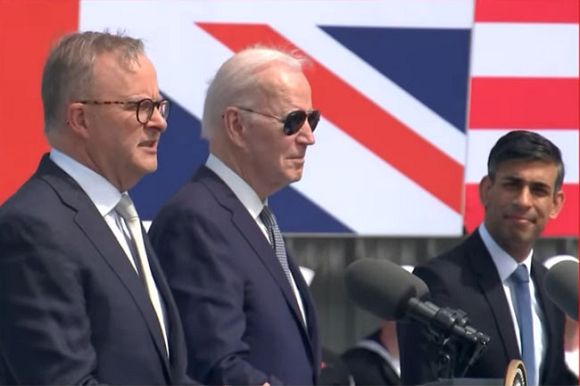Can we bring on global peace and an end to wars? Asks Gerry Georgatos.
CAN WE EDUCATE the whole of humanity to world peace, demilitarisation, disarmament, and discursive conflict resolution?
Many condemn this question as naïve idealism. Peace and the means to peace – peacefulness – have been a near-universal longing, but the majority do not believe in it.
I do believe in its possibility and in the event of its culmination, in its habituation, despite the many millennia of organised protracted violence. The relentless warring.
The disastrous enigma of empire-building, the tragedy of nation-building and the intertwining exploitations of presumptive human differences. And, the frail litany of divisively contaminant intra- and inter-faith obsessions, humanity at long last would be humane.
Our brief claim to life is but that, time sensitive, we come and go.
We must work for a kinder, more loving humanity. We must educate away war.
Educate away the levers to war, ban the means to war, forbid the tools of war, and find all forms of conflict abhorrent.
This is the movement we must dedicate ourselves to — and deliver.
As long as war remains viscerally internecine, hence we are not civil societies but languish in nihilism, chaos, narcissism, anarchy, and barbarism.
As long as war is part of human existence, we will remain the most miserable and reprehensible species on this planet.
We delude ourselves with ignominious justifications. We lie to our souls and poison our conscience. War has no right in the human rights and social justice vocabularies. When we war, this atrocity is the linguicide of the human rights and social justice languages.
Educating humanity towards peace, demilitarization, disarmament, and conflict resolution is an incredibly ambitious, yet deeply meaningful vision.
The human longing for this is our greatest hope.
We are subject to and defined by narratives. We can contextualise extended narratives, vest in education, example the way, imprimatur the means to universal human rights through its only warrant, peacefulness. While no single path guarantees success, several interconnected approaches could bring humanity closer to this goal over time.
Here are a few major strategies:
1. Peace Education from a Young Age
Integrating peace education into school curriculums globally can instill values like empathy, conflict resolution through arbitration and mediation, and global citizenship in children from an early age.
Schools can encourage critical thinking, compassion, and teach negotiation skills — helping young people grow up with a framework that values peace over all forms of violent and stonewalling conflict.
2. Universal Access to Education
Equal access to quality education is a powerful tool for reducing inequality and fostering peace. Educated populations are more likely to question the necessity of war and seek out peaceful alternatives.
Education can also reduce radicalisation to violence and hateful extremisms, as people learn to value diversity and collective humaneness and can better understand complex issues that underlie conflicts.
3. Promoting a Global Culture of Dialogue
Media, arts, and cultural exchanges can help shift collective mindsets toward understanding different perspectives. We can work toward pan-humanism.
Storytelling through media can highlight shared human experiences, fostering empathy across national, cultural, and ideological boundaries. Global platforms that prioritise and ensure peaceful solutions and open discussions could amplify this.
4. Diplomatic Training for Conflict Resolution
Training leaders in human rights education, social justice advocacy, civil rights education and arbitration, diplomacy premised on humanism and equality, negotiation in a world open to ending the dichotomy of the oppressor and the oppressed, and nonviolent conflict resolution could lay the groundwork for peace-oriented governance.
Organisations like the United Nations (UN) and peace NGOs play a role in promoting these skills, but this training should be more widely available across all levels of government and civil society.
5. Public Awareness Campaigns
Informing the public about the devastating impacts of war, the economic cost of militarisation, and the benefits of disarmament can shift public opinion.
When people are aware of the stakes, they are more likely to support peace initiatives and hold their governments accountable to non-violent principles.
In such an educated world, governments are more likely to be comprised of elected members who promote peacefulness and are therefore defined by and tailored to peacefulness.
6. Interfaith and Cross-Cultural Understanding
Many conflicts stem from religious and cultural misunderstandings. Interfaith dialogues and cultural exchange programs can bridge divides, reduce prejudice, and build respect for diversity.
These dialogues could be promoted through schools, workplaces, and community organisations worldwide.
Wars in the name of any identity or faith or any ideologue must end.
7. Global Economic Policies for Equality
Economic inequality and the exploitation of the "masses" are root causes of many conflicts — and economic policies that reduce this gap globally could contribute to peace.
Support for sustainable development, fair trade, and equitable resource distribution can reduce tensions and help to prevent conflicts fuelled by all forms of competition for resources.
8. Institutional and Policy Reforms
Strengthening international frameworks and treaties focused on disarmament, nuclear non-proliferation, and peaceful conflict resolution is essential.
Nations could redirect military spending toward education, healthcare, and infrastructure to meet social needs, which would further reduce the inclination toward militarisation.
9. Community-Based Peace Initiatives
Local peacebuilding initiatives tailored to specific cultural, social, and economic contexts have proven effective in many conflict zones.
These grassroots efforts, if scaled up, can create bottom-up momentum for peace, even when global political shifts seem difficult to achieve.
Most successful movements have started from the grassroots, via the affected.
10. Leveraging Technology and Social Media
Technology can help bring people together but can also be a source of division.
Promoting responsible use of technology, fact-checking, and creating online communities centred around peaceful dialogue and mutual understanding could help mitigate division and create solidarity across borders.
You cannot control what others do, nor should you seek to, instead lead by example and heartfelt articulate reasoning – these are the most impactful means. Live your human rights education and hearts and souls will be "won".
11. Supporting Mental Health and Well-being
A key aspect of peace is addressing trauma and promoting well-being. Conflict often arises from personal and collective wounds. Prioritising mental health, fostering emotional intelligence, and healing from past traumas can empower individuals to approach conflict in nonviolent ways.
Achieving these initiatives on a global scale is a huge challenge, requiring cooperation, sustained commitment, and leadership from individuals, governments, and organisations. However, as interconnected as the world has become, there is a unique opportunity today to amplify these efforts across societies and instill a global consciousness that values peace.
While complete demilitarisation and disarmament may be a distant goal, a gradual and steady movement toward it could build the foundation for a world where peace becomes the default.
There should be no place in a truly human rights-educated world for hate – no anti-Arabism, no antisemitism, no anti-any people.
Dr Maya Angelou rightly claimed:
“HATE, it has caused a lot of problems in this world, but it has not solved one yet.”
Some will caution the elite echelons of powerful excessive self-interest "groups" who ruthlessly rule the "world".
I am reminded of George Orwell’s 1984:
“They fear LOVE because it creates a world they can’t control.”
Gerry Georgatos is a suicide prevention and poverty researcher with an experiential focus on social justice.
 This work is licensed under a Creative Commons Attribution-NonCommercial-NoDerivs 3.0 Australia License
This work is licensed under a Creative Commons Attribution-NonCommercial-NoDerivs 3.0 Australia License
Support independent journalism Subscribe to IA.

Related Articles
- War Memorial's ignorance of Frontier Wars must end
- Campaign to expose Australian war crimes met with silence
- Australia investing heavily into counter-drone military technology
- Australia too soft on war criminals
- An end to war or the end of humanity















